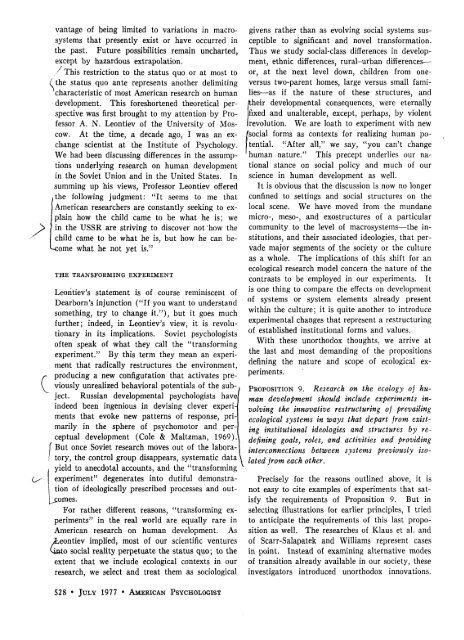Bronfenbrenner 1977
Create successful ePaper yourself
Turn your PDF publications into a flip-book with our unique Google optimized e-Paper software.
c<br />
vantage of being limited to variations in macrosystems<br />
that presently exist or have occurred in<br />
the past. Future possibilities remain uncharted,<br />
except by hazardous extrapolation,<br />
/ This restriction to the status quo or at most to<br />
the status quo ante represents another delimiting<br />
'characteristic of most American research on human<br />
development. This foreshortened theoretical perspective<br />
was first brought to my attention by Professor<br />
A. N. Leontiev of the University of Moscow.<br />
At the time, a decade ago, I was an exchange<br />
scientist at the Institute of Psychology.<br />
We had been discussing differences in the assumptions<br />
underlying research on human development<br />
in the Soviet Union and in the United States. In<br />
summing up his views, Professor Leontiev offered<br />
the following judgment: "It seems to me that<br />
American researchers are constantly seeking to explain<br />
how the child came to be what he is; we<br />
in the USSR are striving to discover not 'how the<br />
child came to be what he is, but how he can be-<br />
'-come what he not yet is."<br />
THE TRANSFORMING<br />
EXPERIMENT<br />
Leontiev's statement is of course reminiscent of<br />
Dearborn's injunction ("If you want to understand<br />
something, try to change it."), but it goes much<br />
further; indeed, in Leontiev's view, it is revolutionary<br />
in its implications. Soviet psychologists<br />
often speak of what they call the "transforming<br />
experiment." By this term they mean an experiment<br />
that radically restructures the environment,<br />
producing a new configuration that activates previously<br />
unrealized behavioral potentials of the subject.<br />
Russian developmental psychologists have<br />
indeed been ingenious in devising clever experiments<br />
that evoke new patterns of response, primarily<br />
in the sphere of psychomotor and perceptual<br />
development (Cole & Maltzman, 1969).<br />
f But once Soviet research moves out of the labora-<br />
/ tory, the control group disappears, systematic data \<br />
yield to anecdotal accounts, and the "transforming<br />
experiment" degenerates into dutiful demonstration<br />
of ideologically prescribed processes and out-<br />
For rather different reasons, "transforming experiments"<br />
in the real world are equally rare in<br />
American research on human development. As<br />
/Leontiev implied, most of our scientific ventures<br />
(into social reality perpetuate the status quo; to the<br />
extent that we include ecological contexts in our<br />
research, we select and treat them as sociological<br />
528 • JULY <strong>1977</strong> • AMERICAN PSYCHOLOGIST<br />
givens rather than as evolving social systems susceptible<br />
to significant and novel transformation.<br />
Thus we study social-class differences in development,<br />
ethnic differences, rural-urban differences—<br />
or, at the next level down, children from oneversus<br />
two-parent homes, large versus small families—as<br />
if the nature of these structures, and<br />
/their developmental consequences, were eternally<br />
fixed and unalterable, except, perhaps, by violent<br />
Devolution. We are loath to experiment with new<br />
/social forms as contexts for realizing human potential.<br />
"After all," we say, "you can't change<br />
'human nature." This precept underlies our national<br />
stance on social policy and much of our<br />
science in human development as well.<br />
It is obvious that the discussion is now no longer<br />
confined to settings and social structures on the<br />
local scene. We have moved from the mundane<br />
micro-, meso-, and exostructures of a particular<br />
community to the level of macrosystems—the institutions,<br />
and their associated ideologies, that pervade<br />
major segments of the society or the culture<br />
as a whole. The implications of this shift for an<br />
ecological research model concern the nature of the<br />
contrasts to be employed in our experiments. It<br />
is one thing to compare the effects on development<br />
of systems or system elements already present<br />
within the culture; it is quite another to introduce<br />
experimental changes that represent a restructuring<br />
of established institutional forms and values.<br />
With these unorthodox thoughts, we arrive at<br />
the last and most demanding of the propositions<br />
defining the nature and scope of ecological experiments.<br />
PROPOSITION 9. Research on the ecology of human<br />
development should include experiments involving<br />
the innovative restructuring of prevailing<br />
ecological systems in ways that depart from existing<br />
institutional ideologies and structures by redefining<br />
goals, roles, and activities and providing<br />
interconnections between systems previously isolated<br />
from each other.<br />
Precisely for the reasons outlined above, it is<br />
not easy to cite examples of experiments that satisfy<br />
the requirements of Proposition 9. But in<br />
selecting illustrations for earlier principles, I tried<br />
to anticipate the requirements of this last proposition<br />
as well. The researches of Klaus et al. and<br />
of Scarr-Salapatek and Williams represent cases<br />
in point. Instead of examining alternative modes<br />
of transition already available in our society, these<br />
investigators introduced unorthodox innovations.


